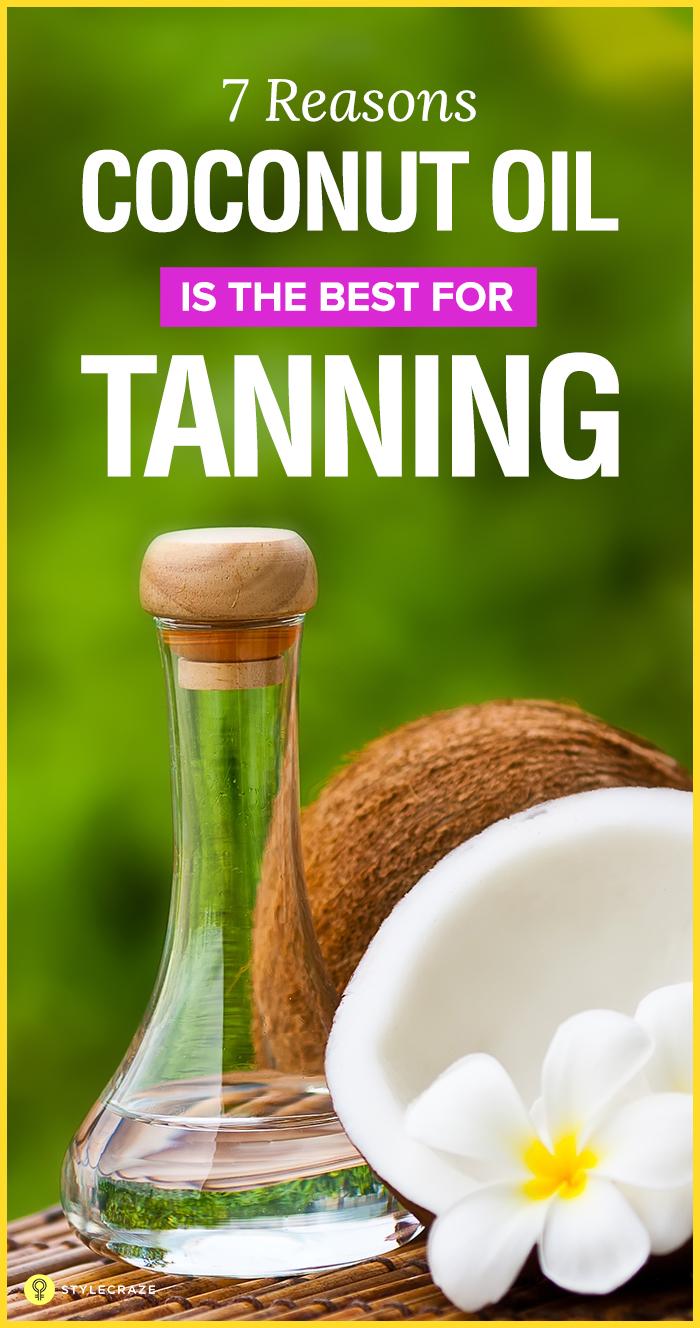Does the bright sun lift your spirits? A hot summer day can
definitely chase away the gloom. The summer months are not liked by a
lot of people thanks to the dust, humidity, and sweating that are part
of the season. But, there are others who wait for those days. It is the
perfect time to get a tan on the skin and boost the appeal. However, it
is also important that you adhere to the safety provisions while
developing a tan. Not all methods used for tanning are safe. The tanning
beds are not natural, after all, and lying on the beach for hours can
expose your skin to the harmful UV rays
(1). Applying a sunscreen is an option but it also comes with some caveats. Using natural remedies is a better option for tanning.
Using Coconut Oil For Tanning:
Most
people are accustomed to using coconut oil either for hair care or
cooking needs. While its benefits for the scalp and hair are undeniable,
you can also use coconut oil for tanning, avoiding the harm caused by
the UV rays
(1).
Below listed are the reasons why you should use coconut oil for tanning:
1. No Harmful Chemicals:
A
lot of sunscreens, including those made by reputed skincare brands, are
often laden with chemicals and ingredients like paraben and solvents.
While they contain SPF for protecting your skin from the harmful UV
rays, those chemicals may cause side effects
(2).
People with sensitive skins fare worse after applying sunscreens. This
applies to various forms of sunscreens, including gels, creams, and
lotions. Coconut oil, on the contrary, does not contain any harmful
ingredient or chemical that can impact your skin negatively.
2. Excellent Skin Nourishment:
Unlike typical sunscreens, coconut oil helps your skin stay hydrated while taking sun baths
(3).
Its natural fatty acids ensure your skin remains well-moisturized, even
hours after application. It helps prevent the skin from getting dry and
wrinkled when you lie for hours on sun-kissed beaches. You get a tanned
look while your skin texture does not suffer.
3. Develops A Layer:
Whether
you apply coconut oil as it is or apply it after mixing with other oils
or ingredients for tanning, it helps form a layer on your skin. This
helps reflect some of the UV rays off your skin.
4. Offers Protection From Infections:
When
you spend hours lying on a sea beach or an open ground for a tan to set
in, your skin gets exposed to the various germs and microorganisms in
the surroundings. Most of it happens without you even being aware of it.
Coconut oil has proven antimicrobial and antifungal attributes that
help protect your skin from getting affected by the germs in the
environment
(4).
5. Shiny Look:
Constant
exposure to strong sunlight can make your skin darker and duller. The
application of coconut oil can help your skin remain shiny even after
you get the tan. It makes your skin darker and shiny, eventually.
6. Helps Get A Tan Faster:
Coconut
oil gets absorbed pretty quickly by the skin and energizes the
melanin-producing layer beneath the skin surface. So, you need to spend
less time in the scorching sun.
7. Does Not Thwart Vitamin D Absorption:
Apart
from tanning, the exposure to sunlight also helps you soak in Vitamin
D. Vitamin D is required for the execution of various physiological
functions in the human body
(5).
The problem with most sunblock creams and sunscreen lotions is that
they block Vitamin D along with the harmful UV rays. That is not the
case with coconut oil.
Ways To Use Coconut Oil For Tanning:
It
is quite simple to use coconut oil for tanning. Take a generous amount
of coconut oil and then massage it all over your body. Massage well, so
that the oil can soak into the skin easily. Based on your skin
sensitivity, you may use protective clothing like a hat or take an
umbrella. Reapply the oil every half an hour during the exposure to the
sun. For the best results, use virgin and organic coconut oil. The
refined and perfumed variants of this oil do not contain all the natural
goodness.
However,
keep in mind that coconut oil, in itself, is not very protective
against UV rays, especially during prolonged exposure to the sun. You
may dab on a good quality waterproof sunscreen with SPF 30 for enhanced
protection. For the best results, mix the sunscreen with coconut oil a
few minutes before you step out into the sun.

Comments
Post a Comment